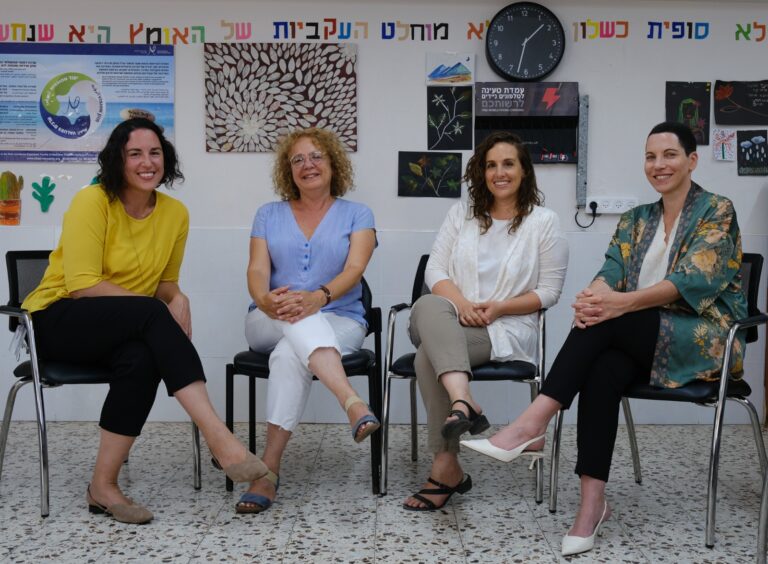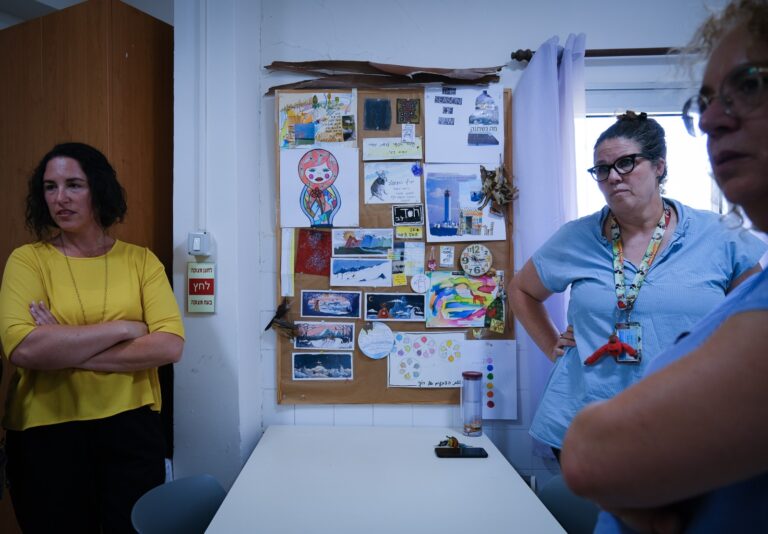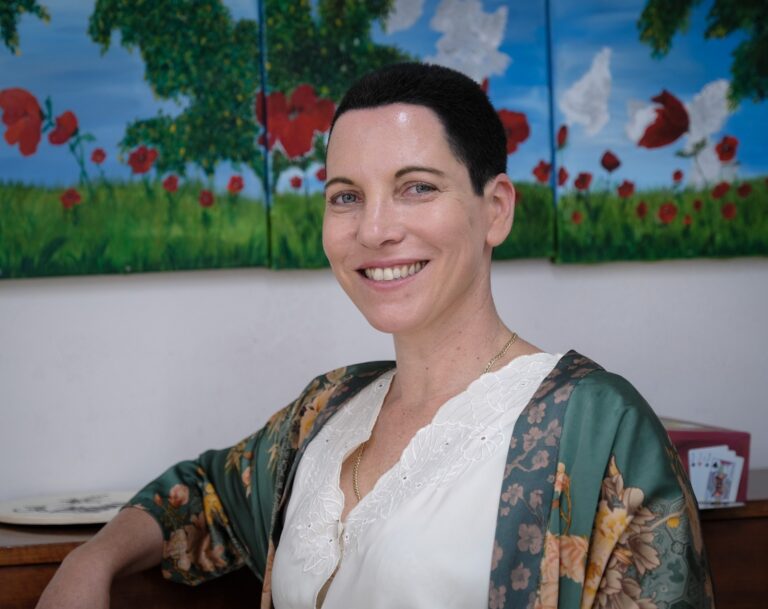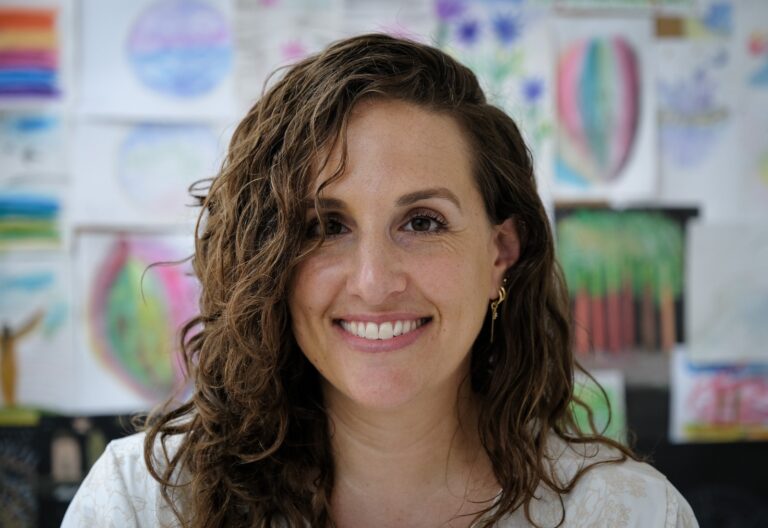
The Sha’ar Menashe Mental Health Center is spread among spacious greenery in the vicinity of Pardes Hana on Israel’s northern coastal plain. The 430-bed hospital has a maximum security wing with four wards for patients with court ordered institutionalization, eight open inpatient wards, a hospice for Holocaust survivors suffering from mental illness, a day in-patient department, rehabilitation department and emergency department.
Since the attacks of Oct. 7 and the ongoing mental health crisis among Israelis, the staff at Sha’ar Menashe have been reexamining their role in Israeli society.
“Before Oct. 7 we said that Sha’ar Menashe was the backyard of Israeli society. Now, we are at the forefront,” Keren Fichman Itzkovich, the psychologist in charge of admissions at Sha'’r Menashe Mental Health Center, told Davar.
A visit to the hospital and a meeting with its senior psychologists reveal the crisis facing the Israeli mental health care system. Not only is there a significant influx of patients in complicated conditions, the workers in Sha’ar Menashe are also deeply concerned by what may still develop in Israeli society in the absence of adequate treatment for the mental distress caused by the war.
“The whole society is wounded, and mental health is still not attended to in Israel,” said Fichman Itzkovich. “Without mental health there would be no society, no taxpayers, no country.”
Shira Yanai Sebag, the psychologist in charge of an open ward, expressed fears for the future.
“We are only at the beginning,” she said. “People are constantly coming to be hospitalized, people who saw the horrors of the war, and people who were flooded with old traumas by the war. We anticipate that this will be the case for a long time.”
Dr. Limor Shefer, director of the psychological service at the hospital, added that some people who did not struggle with anxiety before the war now struggle to execute even basic tasks such as taking the dog out for a walk or running errands.

“It is known that natural disasters cause trauma, but there is also an increased mental reaction in the face of man-made horror,” Fichman Itzkovich said. “It destabilizes all of us. Even when healthy and functioning people are asked now how they are doing, they answer, ‘Fine in relation to the circumstances.’”
Dr. Molly Lindor, deputy director of Sha’ar Menashe, explained that while the clinic has not seen many new cases of post-traumatic stress disorder, they have been flooded by patients facing relapses of their preexisting conditions.

Financial Strain
Despite the serious and diverse mental illnesses faced by the patients at Sha’ar Menashe, senior psychologists and department heads are in the hospital only half the week. Why? Because the budget only contains half a standard salary for a senior psychologist in each department. In the limited time at their disposal, the senior psychologists not only take care of the patients, but also guide therapy groups, mentor the specialized psychologists, and run therapy for other staff members to process the mental strain of the job.
The salary for this “part-time” job is only 4,000 shekels (1,095 USD) a month. All the psychologists at the hospital also practice in private clinics to supplement their income.
Clinical psychologist Tzlil Erez described working for this kind of wage as akin to volunteering. On Oct. 7, Erez’s partner, with whom she shares three children, was drafted into the reserves. In his absence, and during the initial phase of the war when the school system was not operating, Erez had to hire a nanny in order to work. She paid the nanny 20 shekels ($5.48) more per hour than the hourly wage she receives at Sha’ar Menashe.
“It was an experience of being ripped apart,” Erez said. “Losing money for an hour of work is a terrible feeling.”
Low wages are not the only problem facing Sha’ar Menashe. Understaffing is also an issue, as it is throughout much of Israel’s public mental health system. In a particularly egregious example, Sha’ar Menashe’s unit for victims of sexual assault had to close for about six months following the retirement of a veteran nurse. Some departments have only one psychologist and one intern charged with caring for 30 to 40 patients. In order to address the lack of staff, the hospital tries to pair each patient with a staff member who will treat them—from occupational therapists to social work students.

Yanai Sebag explained the importance of one-on-one meetings between therapists and patients. “We don't know in advance how long each patient will be with us, but it is very important to us that even those who come for a week will be met one on one, even if it’s just for a short introductory meeting, so that a patient won’t leave without someone taking an interest in them,” she said. “Sometimes treatment beyond that is not possible. The biggest frustration here is that you want to do more, you want to do everything for the patients, and you can’t.”
Mental Health Care During the War
Since the outbreak of the war and the increase in post-trauma symptoms amongst the patients, Yanai Sebag has had even more on her plate than the usual challenges of working in the public mental health care system. She described the screams of one patient setting off post-trauma responses in others, and the difficulty of responding to rocket sirens.
When sirens go off, she explained, patients and staff rush to the shelter. There, “it’s crowded, people start screaming, crying, saying they want to leave. The staff have to hold down the situation. One of the nurses opened her phone and played music and danced with a group of patients. I was standing with some patients who had anxiety attacks and we did breathing exercises,” she said.
If all this was not enough, the Ministry of Health requested at the beginning of the war that the depleted psychological team also provide an initial psychological response to the residents of the Gaza envelope and northern border who were evacuated to the Tiberias and Jezreel Valley area. The staff also voluntarily took on providing care for evacuees in Givat Haviva after seeing that the evacuation center there was not serviced by any hospital.
For about a month, the psychological treatment of evacuees in many hotels and kibbutzim was the responsibility of the Sha’ar Menashe staff. They found themselves torn between the patients in the hospital and the new responsibility for the evacuees. And all this while their patients in private clinics needed them more than ever.

“As the head psychologist, I was torn,” Shafer said. “I emptied the wards to respond to the evacuees, and our regular in-patients … found themselves in wards without a psychologist because all the psychologists went to treat the evacuees. How did we get to a situation where all the psychologists—who work here almost voluntarily, and in order to earn a living have to work in private clinics in the afternoon—were the only ones in the whole country who can provide an answer to another population in acute need?”
At the beginning of the war, the Ministry of Health requested that psychologists volunteer to help on the home front. For Erez, this demonstrated the government’s lack of understanding of the extent of resources actually required to properly address the crisis.
“We need a long-term and institutionalized solution,” she said.

A Traumatized People
For many Israelis, the trauma of Oct. 7 only added to preexisting trauma. The sudden destruction of Israel’s sense of security and preparedness was immensely shocking, and “the experience of helplessness and lack of control reactivated many old traumas,” Fichman Itzkovich said.
She gave the example of a patient who had successfully finished treatment for her anxiety disorder. After the breakout of the war, she reverted to severe symptoms, staying locked inside her house.

In addition to the clinic’s regular patients and the evacuees, a new population of released reservists has begun seeking the psychologists’ services. Many more reservists probably need mental health support but have not yet accepted that they need help, Erez said.
“People have had experiences that require processing, and the combat injured unit will not be able to take everyone,” she said. “They already say there is no room and there is a long wait time, so they turn to private treatment. I am in the fight for reservists to receive state-funded treatment. I don’t think they should spend money on it, but there are no appointments.”
Shefer explained that treating post-trauma whilst the traumatic event is essentially still continuing is a further difficulty in addressing the patients’ needs.
“One of the most important things in trauma treatment is to help the brain understand that the event is over,” she said. “But here is an ongoing event. We are still in the event and have been for a very long time. Even those who have managed to hold on until now, their strength is crumbling.”
“In thirty years the entire nation will be dysfunctional, because the system did not hear the cry of the people who needed in-depth treatment,” Fichman Izkovich added. “With professional treatment, it is possible now, within six months, to restore these people to functioning. But no one cares.”
Unhelpful Solutions
On the face of it, the government has an intention to fix the problems of the struggling system. Last December, the Ministry of Health announced an extensive plan to improve the mental health system in Israel, including grants for psychologists in the public service and an increase in their salaries.
Shefer called those grants entirely inadequate.
“The grants for psychologists did not lead to recruiting anyone and did not help me expand the response given here,” she said. “There is a strong feeling that those who have been here for years and carry the stretcher are not visible … Without significantly increasing the salary, a one-off grant payment of 16,000 shekels [$4,400] is a joke. The income tax takes a lot. This means that for six months we will earn 57 shekels [$15.80] an hour and not 50 [$13.69]. This is not a solution or even a band-aid.”
The Ministry of Health plan also proposes integrating bachelor’s degree graduates into public psychological treatment in order to expand the number of therapists in the system.
“This is an insult to our profession,” Shefer said of the plan. “It’s not just that we study for so many years and specialize for so many years. As if we could give those who survived this inferno treatment from an unqualified person, just as a soldier injured in the field cannot receive treatment from a nursing student.”
Some psychology interns are suspending their specialization in response to the proposed change, Shefer noted.
“We hear voices saying that if the state says that you don’t need a specialty in psychology to treat people, then they won’t come,” she said. “The internship years are the years in which you start a family, and the internship is necessarily in the public system, which places a financial burden on the interns, so they give it up. This trend will have an impact on the level of care that will be available in Israel. The care will be much less professional and even harmful.”
“Touching trauma in an unskillful way can deepen the wound,” she warned. “We know that with help you can start a new life and we are committed to it. This is what allows people to return to life, work, and earn a living.”






